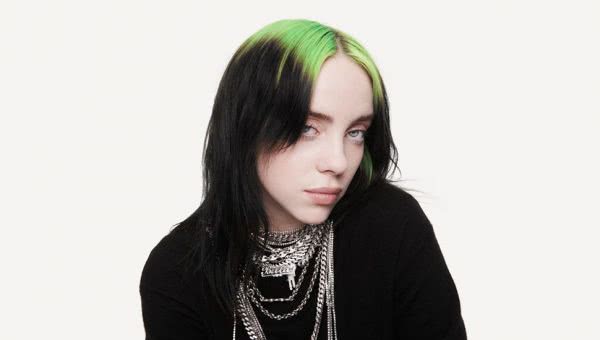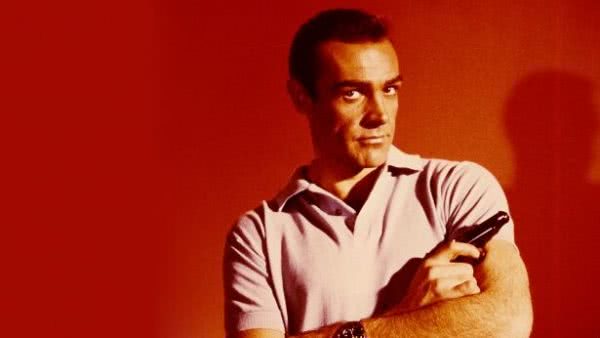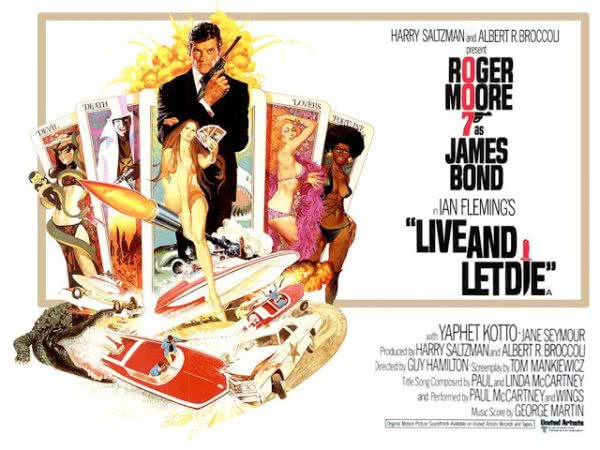The news that Billie Eilish will sing the theme for the April-due No Time To Die was greeted with relief from James Bond fans.
She’s a great choice for two reasons.
Like Daniel Craig’s Bond, she is vulnerable and wounded.

The Bond franchise, after a period of being rattled after the emergence of younger rivals Jason Bourne and Ethan Hunt, found its mojo with Daniel Craig and struck a chord with Gen Z.
The theme songs play a role almost as important as the action, the thrills, the gadgets and the eye candy.
Their role in pop culture are reflected in how they were sampled in two recent hits – Robbie Williams used ‘You Only Live Twice’ throughout ‘Millennium’ (which annoyed composer John Barry because the singer had assured him he’d only use a snippet) while Kanye West tapped ‘Diamonds Are Forever’ for ‘Diamonds’.
But the Bond producers have not always appreciated the importance of the songs.
Love Music?
Get your daily dose of metal, rock, indie, pop, and everything else in between.
They originally turned down ‘Goldfinger’, k.d. lang’s version of ‘Tomorrow Never Dies’, the idea of Aretha Franklin doing ‘You Only Live Twice’, and wanted someone other than Paul McCartney for ‘Live And Let Die’.
At times the choice of songs and singers was not based on highlighting the plot or character but on whose business people pitched the hardest.
So you had stinkers like A-ha’s pop sheen on ‘The Living Daylights’ and the disjointed styles of Alicia Keys & Jack White’s disappointing ‘Another Way To Die’ from Quantum Of Solace.
Others like Lulu’s ‘The Man With The Golden Gun’, Madonna’s ‘Die Another Day’ and Sheena Easton’s ‘For Your Eyes Only’’ are just footnotes in Bond history.
When she landed the song, Eilish stated, “James Bond is the coolest film franchise ever to exist. I’m still in shock.”
Let’s hope her No Time To Die theme maintains the standard of these ten greatest Bond music moments.

John Barry & Orchestra and Monty Norma – ‘James Bond Theme” from Dr. No (1962)
The cool shaken-not-stirred riff weaved into every Bond movie conjuring up glamour and action began as an Indian song with sitar and tabla drums.
‘Bad Sign Good Sign’ was intended by English composer Monty Norman for a musical based on S. Naipual’s best seller A House For Mr. Biswas about the Indian community in Trinidad.
High costs meant the musical was never made.
When Bond producers Cubby Broccoli and Harry Salzman looked for a theme for the first of the movies, Dr. No, Norman offered them the riff.
He also wrote three songs on the soundtrack – ‘Under The Mango Tree’ which actress Ursula Andress and the first Bond, Sean Connery, sang on the beach, ‘Kingston Calypso’ which the three ‘blind’ assassins sang on the way to killing a British agent and ‘Jump Up Jamaica’ in the dance scene in a bar.
Broccoli and Salzman wanted band leader John Barry to build up an arrangement around the riff.
The ‘James Bond Theme’ was recorded on June 21 1962 in London, the riff played by session guitarist Vic Flick on a 1939 English Clifford Essex Paragon Deluxe guitar plugged into a Fender Vibrolux amplifier.
See him recreate it years later, below:

The recording also featured five saxophones, nine brass instruments and a rhythm section.
There was a drama when Barry claimed he wrote the riff. Norman successfully sued two newspapers who repeated the allegation.
Barry testified in court that Norman had a deal with the producers where he would get the credit.
Norman was paid royalties for the theme song from 1962. Between 1976 and 1999 he got £485,000.
(2) Shirley Bassey – ‘Goldfinger’ (1964)
Welsh singer Shirley Bassey’s ‘Goldfinger’ remains the greatest Bond song yet, sassy and brassy and oozing with sexuality.
Its composer John Barry wanted something larger than life, to reflect the character.
Barry worked overnight in his London apartment to finish it, and played it to his flatmate, actor Michael Caine over breakfast.
“That’s ‘Moon River’,” Caine scoffed referring to Henry Mancini’s song from the Audrey Hepburn-starring Breakfast At Tiffany’s.
After the melody was slightly changed to avoid any lawsuits, Barry brought in musical theatre lyricists Anthony Newley and Leslie Bricusse.
They were just told of one scene, where Auric Goldfinger’s secretary Jim Masterson was killed by her body painted gold (and suffocating her) for betraying him to Bond.
Newley was asked to sing it for the soundtrack but declined saying it was a “weird” song, (years later he cut a bass and drums version).
Barry had previously worked with Bassey, as a music director. They’d also been lovers.
The session (on August 20, 1964 at London’s CTS Studios in Wembley) used guitarists Flick, Big Jim Sullivan and future Led Zeppelin founder Jimmy Page.
The song ended on an astonishingly long note, which Bassey, despite having a great set of pipes, initially couldn’t hold.
Barry determinedly kept making her do it.
Finally Bassey slipped behind a sound booth and flung off her bra, and tried it once more.
She recalled of the final note, “I was holding it and holding it – I was looking at John Barry and I was going blue in the face and he’s going – hold it just one more second.
“When it finished, I nearly passed out.”
Listen: Goldfinger theme song

When he first heard it, Salztman barked at Barry (both men disliked each other intensely), “That’s the worst fucking song I’ve ever heard in my fucking life.”
But there was no time to whip up a new song.
‘Goldfinger’ was nominated for an Oscar.
Bassey also landed the themes from later Bond moves Diamonds Are Forever and Moonraker.
Highest Chart Position in Australia: #4.
(3) Adele – ‘Skyfall’ (2012)
Sam Mendes’ understanding of the action thriller format brought Skyfall (the 23rd flick) back to the top of the game – and was in turn stamped down by Adele’s remarkable vocal performance.
In the pre-credits sequence, Bond’s on top of a train wrestling with a villain as it hurtles over a high bridge.
“Take the bloody shot!” M commands by phone from headquarters to the backup M16 agent.
She fires and accidentally hits Bond, and he (sky) falls into the river below.
It’s a terrific opener, made more so as Bond sinks under water, and through the blue void comes the understated piano and Adele intoning, “This is the end/ count your breath and count to ten.”
Watch the Skyfall opening credits below:

While John Barry’s first dozen Bond scores were fun and epic, Adele and producer (and song co-writer) Paul Epworth went for deep and moody.
Epworth watched the first 13 Bond movies back-to-back to decipher “the musical code” of their theme songs.
After determining that these relied on a “minor ninth as the harmonic code,” he got cracking on the music.
He then rang the singer to come over to his studio to finish the lyrics.
Adele had already read the script, so by the time she drove over she had most of the words in her head. They focussed on death and rebirth.
She nailed the demo (working title: ‘When The Sky Falls’) in 10 minutes.
“She’s fast, but it was really quite phenomenal,” Epworth said.
Mendes who played the demo on set for producer Barbara Broccoli and actor Daniel Craig, both of whom “shed a tear”.
Adele and Epworth fine-tuned it over the next 18 months “to get it right”.
When the track was released, critics hailed it as a worthy successor to Bassey and ‘Goldfinger’.
Adele maintains she got the low range because she was heavily pregnant, and that she struggles when performing it in concert because of the lower register.
‘Skyfall’ won an Oscar for best original song and in four years had sold 6 million units worldwide.
Highest Chart Position in Australia: #5
(4) Paul McCartney & Wings – ‘Live And Let Die’ (1973)

Cubby Broccoli had approached Paul McCartney to do Diamonds Are Forever two years before.
But that got scuttled by our old fried, Mr. Contractual Problems.
However the planets were aligned when Beatles producer George Martin worked on the Live And Let Die soundtrack, and brought in his buddy.
The movie’s script was still being written, so McCartney asked if they could send over a copy of Ian Fleming’s book instead.
Wings were at the time recording their Red Rose Speedway album.
On a night off, on a Saturday, McCartney speed-read the novel and the next day was ready to tackle the song.
He recalled to Mojo (October 2010): “I sat down and thought, OK, the hardest thing to do here is to work in that title.
“I mean, later I really pitied who had the job of writing Quantum Of Solace.
“So I thought, ‘live and let die’, okay, really what they mean is live and let live and there’s the switch.
“So I came at it from the very obvious angle. I just thought, ‘When you were younger you used to say that, but now you say this’.”
Linda McCartney, who wrote the middle reggae bit (“what does it matter to ya”), gets a co-writer’s credit.
Wings’ drummer Denny Seiwell recounted, “Paul sat down at the piano and said, ‘James Bond… James Bond… da-da-dum!’, and he started screwing around at the piano.
“Within 10 minutes, he had that song written. It was awesome, really.
“Just to watch him get in there and write the song was really something I’ll remember the rest of my life.”
The track was recorded in London a week after.
Here’s a link to the final rehearsals with the orchestra.
Martin took the track to the Caribbean where filming was taking place, and played it to them.
They loved the song and wondered who to get to sing it, Saltzman suggested Shirley Bassey or Thelma Houston.
Martin’s response: “You’ve just heard one of the biggest selling artists in the world.”
In any case, McCartney had stipulated that if his song was used, the Wings version had to be used for the front credits.
Another more urban version was also cut for the soundtrack album. It was by English singer and actress Brenda J Arnau who’s seen performing it in the movie’s Harlem restaurant scene.
‘Live And Let Die’ was nominated for an Oscar for best original song but lost out to Barbra Streisand’s ‘The Way We Were’.
Highest Chart Position in Australia: #5.
(5) Tina Turner – ‘GoldenEye’ (1995)
U2’s Bono and The Edge wrote the song for Tina Turner when it was announced she was tapped for the movie Pierce Brosnan took over.
According to Turner, the demo they sent to her home in Switzerland was “bad”. Listen to it here and see if you agree:
https://www.youtube.com/watch?v=e_iTQ4135Xg
“Bono sent me the worst demo. He kind of threw it together as if he thought I wasn’t going to do it,” she laughed.
But Turner, who always wanted to be a Bond girl, clicked immediately with the song:
She said “To me sometimes soundtracks don’t go with the movie It just sounds like a good song. This one sounds like it fits the movie.”
The song forced her to sing a new way and make it more creative.
It was produced by, British producer/ remixer/ composer Nellee Hooper, best known for his work with Massive Attack, Madonna, U2 and Björk.
The track was huge in Europe and the US.
Highest Chart Position in Australia: #63.
(6) Nancy Sinatra – You Only Live Twice (1967)
One of the most covered Bond songs, ‘You Only Live Twice’ was written by John Barry and Leslie Bricusse whose lyrics included lines as “love is a stranger who beckons you on.”
For the powerful anthemic song, Barry had soul queen Aretha Franklin in mind.
But Cubby Broccoli wanted his good friend Frank Sinatra.
Cranky Frankie turned it down but suggested his 24-year-old daughter Nancy, who’d just had a smash hit with ‘These Boots Are Made For Walking’.
The relatively inexperienced Nancy caused a problem in the London studios when she came in for a day-long session on May 2, 1967.
She admitted, “I was panic-stricken from the very beginning of the whole procedure. I would rather have root canal surgery than go through that again.”
So Barry recorded the 60-piece orchestra first before tackling the singer by herself.
To her credit, Nancy was willing to step away and let someone like Bassey do it because she had a better range than her octave and a half.
But Broccoli wanted a Sinatra, and Barry assured her, “No, no, we want your sound.”
Listen: You Only Live Twice theme song

Over the day, they did 30 vocal. takes. After she left, he painstakingly took the best from 25 takes.
Sinatra revealed, “There were bad notes, they just edited it together. They didn’t want to embarrass me. I tried my best – I was 26 years old and really scared.”
Highest Chart Position in Australia: #10
(7) Shery Crow, ‘Tomorrow Never Dies’/ k.d. lang ‘Surrender’ (1997)
When David Arnold took over the score of Tomorrow Never Dies, the 18th Bond outing, he asked acts to submit songs around that title.
These included Pulp’s Jarvis Cocker, Saint Etienne, Marc Almond, Sheryl Crow, The Cardigans (who begged off because they were road-weary and regretted it forever after), and Danish pop band Swan Lake.
The front runner tune was a brassy Barry/Bassey type effort that Arnold wrote with David McAlmont and lyricist Don Black (a Bond veteran who penned the words to ‘Diamonds Are Forever’ and ‘The Man With The Golden Gun’) and with a truly fantastic vocal by k.d. lang.
At the last moment, MGM studio went for Crow’s, which became her fifth Top 20 US hit.
The Lang track was renamed ‘Surrender’ and relegated to the end credits (although parts of it emerges through the score) and is still considered the better song,
Crow’s title song, though, captured what Bond should have been in the ‘90s.
Listen: Sheryl Crow – Tomorrow Never Dies

Highest Chart Position in Australia: #65
(8) Tom Jones, ‘Thunderball’ (1965)
Thunderball was the fourth Bond movie and the third to be scored by John Barry who gulped, “It’s the worst title for a song, as you can imagine.”
The solution to this trouble lay in an Italian article which referred to Bond as “Mr. Kiss Kiss Bang Bang”.
Under that title of ‘Mr. Kiss Kiss Bang Bang’ with lyrics by Leslie Bricusse, Barry organised for Shirley Bassey and Dionne Warwick to do alternate versions.
Two weeks before the movie opened, the studio, United Artists, wanted a song with the movie’s title.
‘Mr. Kiss Kiss Bang Bang’ was relegated to the end credits – and when Bassey heard Warwick’s version was to be used, she called her lawyers.
The studio reacted by dropping both versions, and they would not be released until the ‘90s.
Don Black’s lyrics for the new song gave no indication of what the title was about.
Tom Jones – ‘Thunderball’

When they brought in Tom Jones to the studio, the Welsh beefcake’s first question was: “What the fuck is a thunderball?”
Barry told him: “Just go in there, sing the hell out of it and leave!”
Jones almost fainted in the recording booth after singing the song’s final, high note.
“I closed my eyes and I held the note for so long when I opened my eyes the room was spinning.”
Barry said of the song. “It was fun and silly, and we got away with it because this big thing ha grown up around the Bond films.”
Highest Chart Position in Australia: #10
(9) Shirley Bassey –‘ Diamonds Are Forever’ (1971)
Don Black regards ‘Diamonds Are Forever’ as his favourite Bond set of lyrics.
He once said, “I’ve always thought a Bond song should be provocative and sensual. There’s something about the song that seduces you into it.”
However the song’s sensuality almost had it shelved when he and melody writer John Barry presented it to the producers for the seventh Bond flick.
Harry Saltzman hated the song, especially for its double entrendes.
Cubby Broccoli had to talk him into approving it.
It was Bassey’s second Bond song; she would return for 1979’s Moonraker.
Bond creator Ian Fleming took the title for his 1956 book from the slogan “A diamond is forever”.
It was a successful 1940s marketing campaign by the De Beers mining company to market diamonds by equating them with love and romance.
In the studio, Barry encouraged Bassey to imagine she was singing about a penis.
Which explains why she could deliver such lines as “Diamonds are forever, hold one up and then caress it. Touch it, stroke it and undress it…” with the desired effect.
Black told The Sunday Times (August 10, 2008) “But he never said that to me when I was writing it. I was writing about a diamond!”
Watch it here:

It won Britain’s prestigious Ivor Novello songwriting award.
Highest Chart Position in Australia: N/A
(10) Chris Cornell – ‘You Know My Name’ from Casino Royale (2006)
Some expressed surprise at the choice of Chris Cornell to do a Bond song – but none more than the Soundgarden singer himself.
He liked the early Connery moves but not the later ones.
However after visiting the set in Prague and being shown a rough edit, he was impressed with its grittiness and agreed.
The Bond people had a good reason to want Cornell. The coming of Daniel Craig in the lead gave the franchise a new lease of life – the story took Bond back to his beginnings as an agent with a licence to kill – and they were ready to pull out all stops.
It worked: the budget of $150 million translated to a box office turnover of $599 million.
Composer David Arnold, marking his fourth Bond movie, explained, “We wanted a singer who sounded like Daniel Craig looked and moved.
“Chris has the power, grit and, when needed, sensitivity to welcome the audience into the world of Casino Royale.”
The Cornell song’s riff was played through the film in place of the Bond theme to signify the inexperience and youth of the character in the plot.
‘You Know My Name’ was initially written separately, Cornell in his apartment in Paris and Arnold in his London home.
Finding it difficult to write lyrics for a character, Cornell as at a loss for a month until he started to plug into the agent’s character, more emotional and conflicted than suave and super-confident.
“Because this particular Bond is very edgy, but also has a lot of emotional depth, it’s a lot easier.”
When he and Arnold met up and exchanged their ideas, Arnold was exhilarated.
“It was almost like we wrote two parts of the same song.”
Chris Cornell – ‘You Know My Name’

Aside from wanting to make it the most aggressive Bond song Cornell was inspired by two past Bond movie moments.
He wanted to use the crooner style of Tom Jones on ‘Thunderball’ and have fun the way Paul McCartney did, writing a song like ‘Live And Let Die’ which he would never have if not for the movie.
Highest Chart Position in Australia: #18.

































